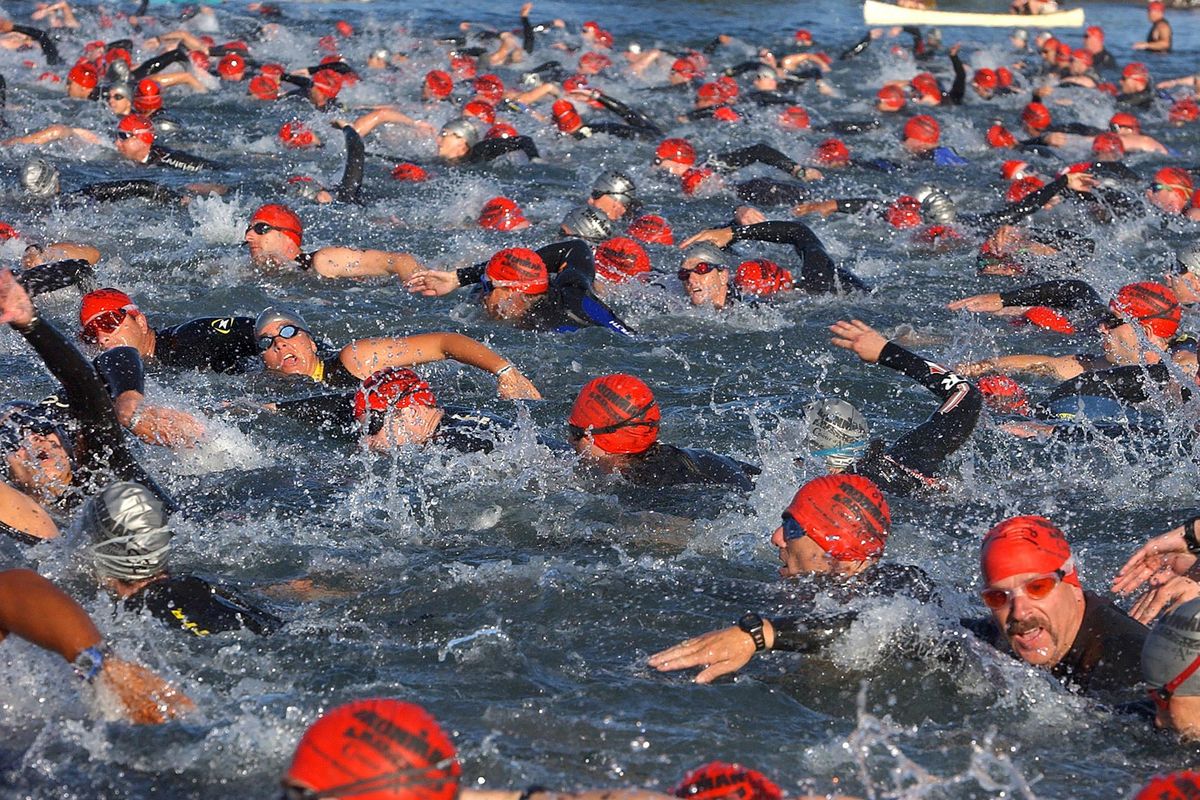Coeur d’Alene prepares for its final full Ironman

Nine Ironmans to his name, Heath Wiltse took a six-year hiatus from the punishing triathlon with the intent of returning in 2018.
The Coeur d’Alene man has come tantalizingly close to qualifying for the world championships, but was especially disheartened after finishing two spots short in his latest attempt.
When Wiltse learned the annual 2.4-mile swim, 112-mile bike ride and 26.2-mile run was leaving the Lake City after a 14-year stay, the 42-year-old expedited his comeback.
Wiltse is one of more than 1,000 participants in Sunday’s race, Coeur d’Alene’s last full Ironman. The triathlon, which features participants from 44 states and 16 countries, begins at 6 a.m. at City Beach.
“I knew if I didn’t do the final Ironman in Coeur d’Alene, I’d regret it,” Wiltse said. “I wanted to give it another go and try to qualify.”
Ironman Coeur d’Alene offers 40 qualifying slots for the Oct. 14 world championships in Kona, Hawaii.
First-timers like Jamie Ploetzner are more concerned with crossing the finish line.
Ploetzner, a Dallas resident and Rathdrum native, had long toyed with the notion of competing in Ironman Coeur d’Alene. News of the event leaving North Idaho prompted his registration.
“When they made the announcement it was leaving Coeur d’Alene, it really forced my hand to go out and do it,” said Ploetzner, a 33-year-old civil engineer. “It’s a great event. It’s on my bucket list.”
The Coeur d’Alene Chamber of Commerce announced in June that it wouldn’t renew its contract with the World Triathlon Corp for the full-length Ironman, which cost the chamber $50,000, according to records.
The chamber did, however, keep its $25,000 contract for Ironman 70.3, the half-Ironman that began in June 2016.
The arrangement allows Coeur d’Alene to keep its association with the Ironman event, while reducing the financial support the chamber paid to the for-profit World Triathalon Corp., Steve Wilson, the chamber’s president and chief executive, said in a June statement.
Those weren’t the only reasons for the amended contract.
“The new agreement is aimed at cutting down on event fatigue and will ease the strain on the recruitment and steep number of volunteers,” Wilson said in the statement. “Under the agreement, interruption to businesses in the downtown core will be greatly diminished, while the intangible, healthy lifestyle and cultural benefits of the relationship to an Ironman are intact.”
Ironman regional director Keats McGonigal said his group wanted to keep the event in North Idaho, one of 43 full Ironmans across the globe.
“It was certainty our intention on keeping it here and make it as long-standing a possible,” McGonigal said Friday.
But participation dropped from an all-time high of 2,800 in 2011 to 2,011 in 2015, and has continued to fall sharply since.
Pros often groused about Lake Coeur d’Alene’s chilly water in June and the area’s mercurial weather, so officials pushed the date to August in 2016.
After the change of date, it became the last qualifying event for the world championships. With most professionals having already qualified and in cool-down mode before worlds, 2016 Ironman Coeur d’Alene didn’t feature professionals. Neither will its finale.
The world’s most-decorated triathletes could be seen kicking down Sherman Avenue before the change.
“(The move) hasn’t exactly translated as well as we would have liked,” McGonigal said.
Conversely, Ironman 70.3 has drawn decent numbers. The event drew 2,391 in its debut last summer but dropped to 1,677 this year, a number that still exceeds the last two full Ironmans (the all-time low of 1,092 in 2017 and 1,346 in 2016).
“I wish they worked harder to keep it in Coeur d’Alene,” Wiltse said. “It brings people in from all over the world and pumps money into the local economy. To lose a world-class event for any town is a bad thing.”
According to the Spokane Sports Commission, the full Ironman has over $7 million in positive economic impact to the region’s economy based on sales, lodging, food, shopping and gas.
Scott Knapp, an employee at the Vertical Earth bike store in downtown Coeur d’Alene, said the full Ironman brought more out-of-towners willing to spend.
“When you’re a local, like a lot of the (Ironman 70.3 participants) are, you already have what you need at home,” Knapp said. “When you’re from out of town, you’re more apt to go buy something you need. But none of the bike shops are too worried about the change.”
But regret isn’t the only sentiment following in the event’s imminent wake. Ali Krall, a bartender at Doghouse in downtown Coeur d’Alene, is happy about Ironman’s departure.
“It just suffocates everything. The traffic down here gets bad,” said Krall, a longtime Coeur d’Alene resident. “It just gets ornery. Everyone down here is working doubles and triples, and a lot are people from out of town aren’t tipping great.”
With two Ironmans in town, the full coinciding with the North Idaho Fair, wrangling volunteers has been harder.
Dani Zibell-Wolfe is the chamber’s Ironman volunteer director and is expecting about 2,800 helpers for this year’s race, which is down from the typical 3,500.
Volunteers are needed for about 100 different jobs during the event. Their duties include helping athletes peel off their wet suits and crowd control.
“I have seen tremendous friendships formed among volunteers,” Zibell-Wolfe said. “And the stories about the friendships between the athletes and the volunteers are incredible.”
Sixty of this weekend’s triathletes hail from Spokane and 39 are from Kootenai County.
Becky Kramer contributed to this report.